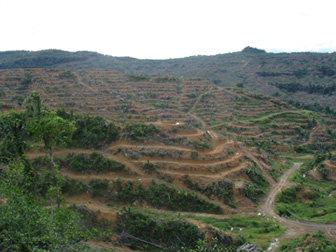The government of Sarawak aims to convert more than 1 million hectares (2.5 million acres) of tropical forest by 2020, according to the Malaysian state’s Land Development Minister, James Masing.
Speaking to The Star last month, Masing said Sarawak would more than double its oil palm estate from the current 920,000 ha to 2 million hectares over the next decade. The state plans “more aggressive development” of native customary rights land (NCR), which covers an estimated 1.5 million hectares, but has been a point of conflict between industrial developers and traditional forest users like the Penan. The government has already approved more than 720,000 hectares of NCR land for joint-venture development, according to The Star.

|
The Bruno Manser Fund (BMF), a group which campaigns on behalf of Sarawak’s forest people, called the announcement a “shock”, noting that indigenous organizations in Malaysia last year demanded “a moratorium on the development of new plantations due to the blatant disregard of native rights by the state authorities.” BMF said the European Union has delayed timber talks with Malaysia over human rights concerns, including the Sarawak government’s disregard of court rulings in favor of forest people.
BMF attributes the difficulty in enforcing court rulings and environmental laws to corruption under Sarawak’s Chief Minister, Abdul Taib Mahmud, who has ruled the state since 1981. Taib’s family owns large overseas real estate holdings, the origin of which is unexplained.
According to The Star, private oil palm plantations make up about 80 percent of the total planted area in Sarawak. The major planters include Rimbunan Hijau Group, Ta Ann Holdings Bhd, Samling Group, Lembaga Tabung Haji and Boustead Group. Sime Darby Bhd and IOI Corp Bhd are also investing in expansion in the state.
Related articles







